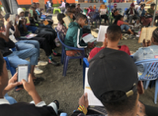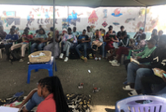Methali hii ina maanisha hupaswi kutegemea matokeo mazuri kabla hayajatokea. Hupaswi kutegemea mayai yako yote yatakuwa vifaranga wenye afya nzuri. Je, una hadithi kuhusu methali hii? Toeni maoni!
Rekodi ya kwanza iliyoandikwa ya methali hii ya Kiingereza ni shairi iliyoandikwa mwaka wa 1570 na Thomas Howell:
“Usiwahesabu kuku wako ambao hawajaanguliwa,
Pima maneno kama upepo, hadi upate uhakika”
Lugha nyingi zina methali zinazofundisha kanuni karibu na hii. Mifano:
Kiswahili:
“Tujivune hatimaye.”
Kifaransa:
“Il ne faut pas vendre la peau de l'ours avant de l'avoir tué.”
Usiuze ngozi ya dubu kabla ya kumuua.
Kiarabu:
“لا تشتري السمك وهو في البحر بل انتظر حتى يصطاد”
Usinunue samaki yumo baharini; subiri hadi itakapokamatwa.
Kijerumani:
“Man soll den Tag nicht vor dem Abend loben.”
Usisifu siku moja kabla ya jioni.
Kilatini:
“Ante victoram ne canas triumphum”
Usiimbe shangwe kabla ya ushindi.
Kireno:
“Não conte com o ovo dentro da galinha.”
Usihesabu yai ndani ya kuku.
Picha hii ilichorwa kwa kutumia Akili Bandia (AI). Mnafikiriaje? Toeni maoni!























